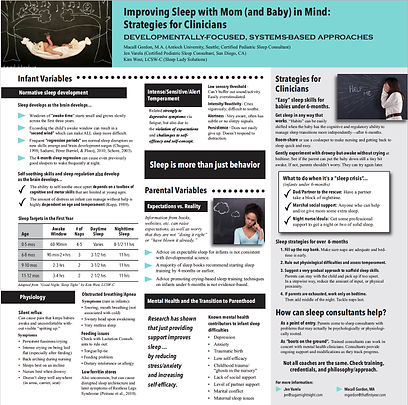
For
Professionals
Videos/Trainings
Temperament and Sleep:
A workshop for coaches and clinicians
What does temperament have to do with sleep? EVERYTHING. This hour-long video walks you through the ways that temperament affects sleep, parenting, and everything else and gives key information about what this population needs you to understand about their experience.
A Critical Look at the Research on Crying-it-out in Infants <6 Months
This video gives an overview of some basic skills in understanding a research study, then takes a deep dive into the research that reportedly supports the use of crying-it-out (Ferber, etc.) in infants under 6 months. What does the research actually say? The answer might surprise you.
Research applicable to clinical work with parents.
These files are all available on my page on ResearchGate.net
Examining the congruence between research and parenting advice on the use of crying it out for infant sleep.
Poster presented at the International Congress for Infant Studies Conference. Ottawa, Canada • July 2022
This review examined the content of the ten most popular sleep training books (and two internet-based programs) aimed at parents. Without exception, some form of extinction (crying it out) was recommended starting at between 3-5 months. Two sources recommended starting as early as eight weeks. Advice was compared to studies identified as evidence of empirical support for the practice with a focus on what research supports the intervention's use in younger infants. Results showed that empirical support for the use of CIO in infants under six months is limited to only seven studies and a majority of these only included some younger infants as part of a much larger sample (e.g., 4-52 months). Further, research does not support the notion that CIO is as universally quick, easy, or effective as advice books indicate it will be. More developmentally aware research is needed and, rather than merely report group averages, results should also indicate ranges of responses, so that parents can have a better understanding of what constitutes an expectable potential response to sleep training for their infant.
Paper draft available here.
Improving sleep with mom (and baby) in mind: Strategies for clinicians
Poster presented at the Postpartum Support International Conference. Portland, OR • June 2019
This poster provides information for clinicians about normative sleep development and easy strategies that they can offer to mothers with postpartum mood challenges. Information is developmentally-focused and considers the whole family system.
The effect of difficult temperament on experiences with infant sleep and sleep training: A survey of parents
Poster presented at the Occasional Temperament Conference. University of Virginia • November 2020
Research and parenting advice consistently endorse the
use of extinction to improve sleep in infants as young as
2- to 4 months and further submit that the intervention
is fast, effective, and without side effects. Parents are told
that crying will be the worst on the first night and will
quickly be extinguished in 3 to 4 nights.
While it is understood that difficult temperament negatively
affects both sleep onset and duration, temperament is rarely
considered a factor in research outcomes or the advice that
proceeds from it. Is it possible that temperament variables
like reactivity, low sensory threshold, persistence, etc., result
in different outcomes for both infants and parents?
METHODS: Parents of infants 6-18 months; n= 404; M =11.2 mos.) and young children (2-6 years; n=452; M=43.1 mos.) were recruited to participate in an online survey. RESULTS: Higher levels of “difficult” temperament predicted difficulties in all sleep behaviors (naptime, nighttime sleep, difficulty falling and staying asleep). Higher levels of difficult temperament were also predictive of parents attempting a greater number of sleep interventions with less success and experiencing much more crying than expected. DISCUSSION: Further research should examine what interventions are best suited to the aspects of temperament that make both sleep and interventions more challenging.
Is "crying-it-out" appropriate for young infants? A critical review of the literature on the use of extinction.
Poster presented at the World Infant Mental Health Conference Paris, France • July 2006
ABSTRACT: The most empirically supported and endorsed approaches to preventing or ameliorating infant sleep problems involve various forms of extinction (crying it out). This approach is widely recommended by pediatricians and mainstream parenting publications for infants as young as 3- to 4-months. A review of the literature regarding the cry-it-out (CIO) approach to infant sleep reveals that empirical support for this early start date is lacking. Much of the existing literature used to validate the use of extinction with infants does not include infants under 1 year in the sample population. The subset of studies that include infants do so as part of a much larger sample comprised of wide age ranges (e.g., 9-60 months). Results from these studies do not specify outcomes by age and obscure the existence of differential effects for infants. Though CIO is recommended as the approach of choice for infant sleep, relatively little is known about its effects on infants under one year.
Sleep interventions and parent-child well-being
Poster presented at the World Association for Infant Mental Health Conference • Yokohama, Japan, August 2008
Three important questions are covered in this poster:
• Does nightwaking that involves parental attention invariably constitute a sleep problem for children and parents?
• Does a paradigm of independent, self-settling infant sleep patterns represent a solution or an added stressor?
• Are children’s nighttime behaviors and parental sleep interventions related to parent-child well-being?
The three research studies presented in this poster explore the possible challenges associated with a focus on various sleeping arrangements and routines. The poster also highlights the importance of alternative approaches and flexibility in mothers’ responses to nightwaking based on maternal perceptions of appropriate care and infants’ temperamental and physiological needs.
_edited.png)




